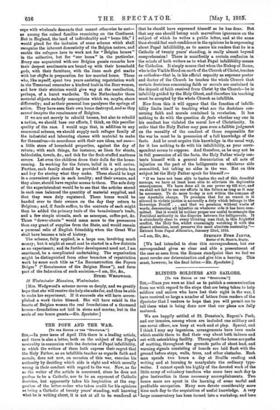THE POPE AND THE WAR.
[To vas Eons. or 77r1 "sroerorsn."J Sin,—In your issue of April 17th there is a leading article, and there is also a letter, both on the subject of the Pope's neutrality in connexion with the doctrine of Papal infallibility, in which the writers of them both express their regret that the Holy Father, as an infallible teacher as regards faith and morals, does not now, on occasion of this war, exercise his authority by deciding which aide is right and which morally wrong in their conduct with regard to the war. Now, as far as the writer of the article is concerned, since he does not profess to be a Catholic, nor to be an exponent of Catholic doctrine, but apparently takes his inspiration at the sug- gestion of the letter-writer who takes credit for his opinions se being a Catholic of twenty years' standing, well knowing what he is writing about, it it not at all to be wondered at that he should have expressed himself as he has done. But that any one should betray such marvellous ignorance on the subject of which be writes a public letter, and at the same time should feel such confidence in the opinions he is expressing about Papal infallibility, as to assure his readers that he is a Catholic of twenty years' standing, is really almost beyond comprehension! There is manifestly a certain confusion in the minds of both writers as to what Papal infallibility means for Catholics. It simply means that when the Bishop of Rome, who is the Visible Head on earth of the Church of Christ, teaches en cathedra—that is, in his official capacity as supreme pastor and doctor of the Church he teaches the whole Church that certain doctrines concerning faith or morals are contained in the deposit of faith received from Christ by the Church—he is infallibly guided by the Holy Ghost, and therefore his teaching must be accepted by the whole Church as infallible.
Now from this it will appear that the function of infalli- bility limits itself to teaching what are the doctrines con- cerning faith and morals contained in revelation. It has nothing to do with the question de facto whether any one in his conduct has violated the moral law of Christianity. Di order that the Holy Father may pass even a fallible judgment on the morality of the conduct of those responsible for the war he most be in possession of a full knowledge of the facts. And he must acquire this knowledge in the usual way, for it has nothing to do with his infallibility, as your corre- spondent seems to suppose. And therefore, as be may not be in full possession of all the facts, the Holy Father wisely con- tents himself with a general denunciation of all acts of injustice on the part of the belligerents on whichever side committed, but taking no sides in the war. But on this subject let the Holy Father speak for himself "If we have not been able to hasten the end of this dreadful scourge, we have at least been able to alleviate its deplorable consequences. We have done all in our power up till now, and we shall not fail to use our efforts in the future as long as it may be necessary. To do more to-day is not within the compass of our Apostolic charge. To proclaim that for no reason is it allowed to violate justice is assuredly a duty which belongs to the Sovereign Pontiff . . . and that we proclaim without waste of words, denouncing all injustice on whatever side it has been com- mitted. But it would be neither proper nor useful to entangle the Pontifical authority in the disputes between the belligerents. It is abundantly clear to every thinking man that, in this frightful conflict, the Holy See, whilst unceasingly watching it with the closest attention, mast preserve the most absolute neutrality."— Extract from Papal Allocation, January 22nd, 1915.
Rector of St. Maxis a, Rugby.
[We had intended to close this correspondence, but our correspondent gives so clear and able a presentment of the case as seen from the Roman standpoint that we feel we must revoke our determination and give him a hearing. This must, however, be the final letter.—En. Spectator.]


































 Previous page
Previous page